When it comes to home décor, selecting the right mirror frame material is more than just a design decision — it’s a way to elevate your entire space. Whether you’re updating a bathroom, bedroom, or hallway, the mirror border design and material you choose can make a dramatic difference in both aesthetics and functionality.
You may also like: Scalloped Wall Mirror – 10 Benefits That Make It Perfect for a Stylish Home
Why Mirror Frame Material Matters More Than You Think
The mirror frame doesn’t just support the glass — it sets the tone for the room, enhances your interior design, and offers texture and personality. Choosing the best mirror framing material impacts durability, especially in high-moisture areas like bathrooms. It also helps in tying together furniture and décor themes, especially when you’re trying to match mirror frames with bedroom furniture.
Top 7 Mirror Frame Material Options for Every Style
Here are seven high-impact types of mirror frames that suit different décor preferences and room needs:
Wood – Timeless and Versatile
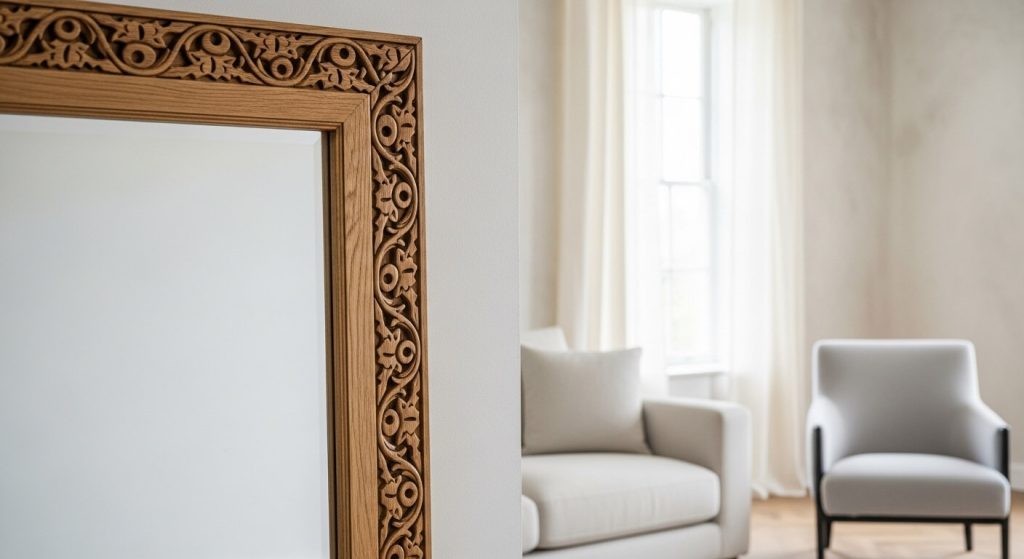
Wooden mirror frames are a classic choice that complements everything from rustic to modern interiors. Choose mirror frame design wooden options like oak, walnut, or reclaimed wood for natural charm.
- Best for: Living rooms, bedrooms, entryways, rustic or farmhouse themes
- Pros: Warm, eco-friendly, customizable
- Cons: May warp in humidity if not treated
Mirror frame styles tip: For a minimalistic look, go with smooth, light-toned woods like birch or ash.
Metal – Sleek and Industrial
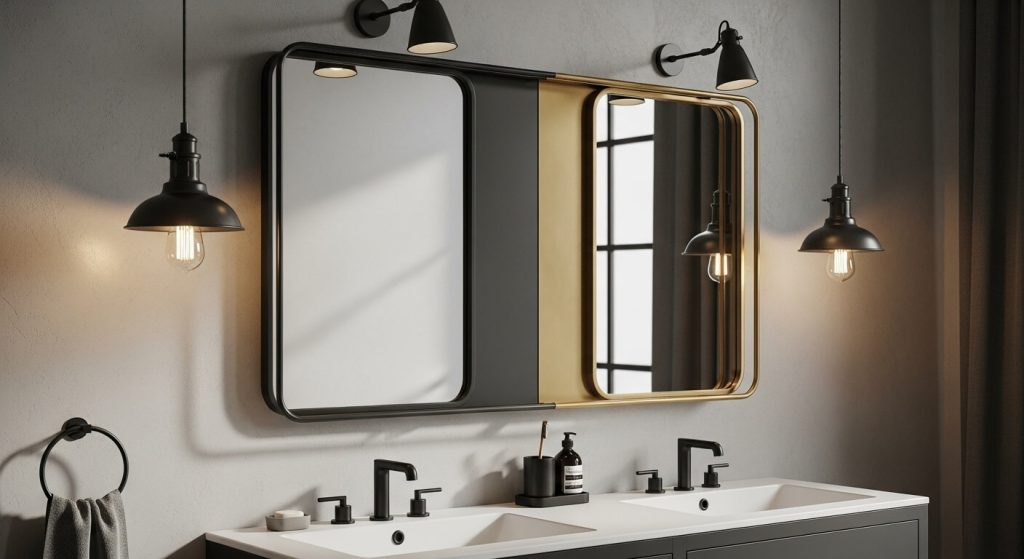
Metal mirror frames — including aluminum, brass, or black iron — offer a sleek, contemporary vibe. They’re perfect for modern or industrial settings.
- Best for: Bathrooms, lofts, minimalist interiors
- Pros: Durable, rust-resistant options, elegant shine
- Cons: Can appear cold or impersonal in excess
Mirror border design tip: Use thin black metal frames for a sharp, gallery-inspired look.
Plastic – Affordable and Lightweight

Plastic frame mirrors offer a cost-effective, versatile solution with endless colors and finishes. They’re especially useful in casual or temporary settings.
- Best for: Kids’ rooms, dorms, rental apartments
- Pros: Lightweight, inexpensive, easy to style
- Cons: Less durable, may appear cheap if not styled well
Resin – Artistic and Moldable
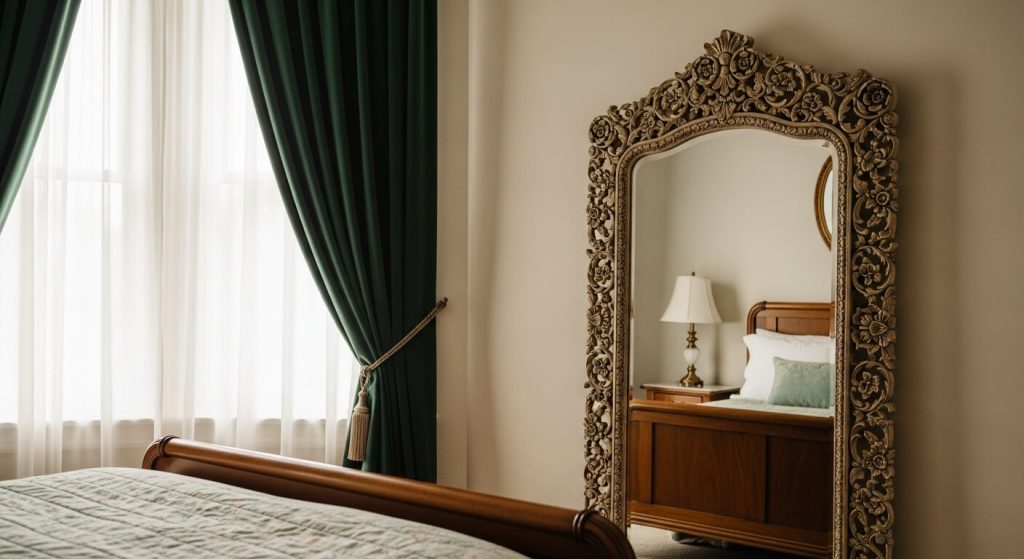
Resin allows intricate design mirror options, making it a top pick for baroque or vintage-inspired interiors.
- Best for: Artistic, vintage, or eclectic spaces
- Pros: Moldable, detailed, available in unique colors
- Cons: Not eco-friendly, can chip easily
Mirror frame material idea: Try hand-painted resin for an artistic focal point.
Stone – Earthy and Luxurious
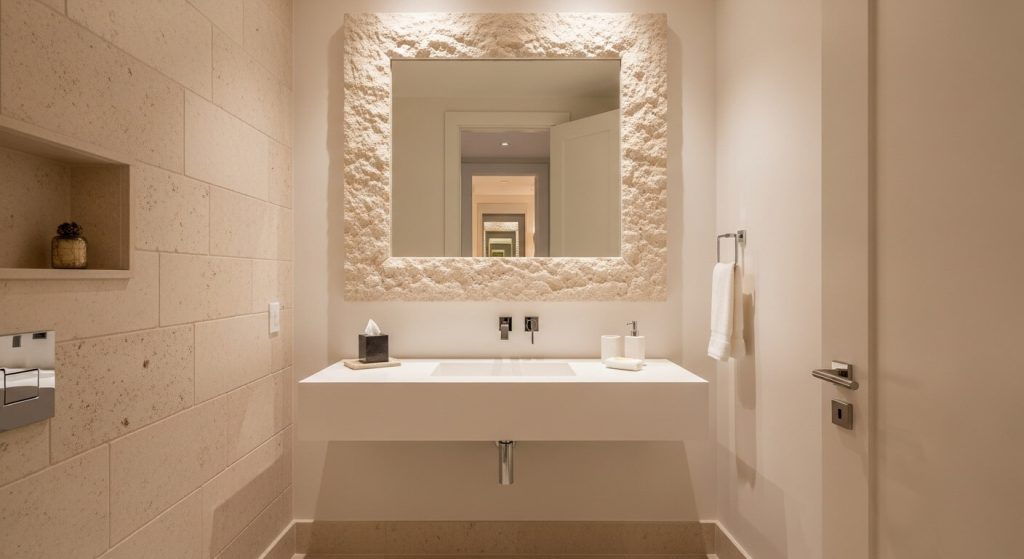
Stone mirror frames made from marble or granite offer a grounded, spa-like luxury. They elevate the elegance of any space.
- Best for: Bathrooms, luxury homes, spa-inspired rooms
- Pros: Unique natural patterns, high-end appearance
- Cons: Heavy, expensive
Mirror material types: Stone adds natural weight and texture, perfect for serene settings.
Bamboo – Sustainable and Exotic
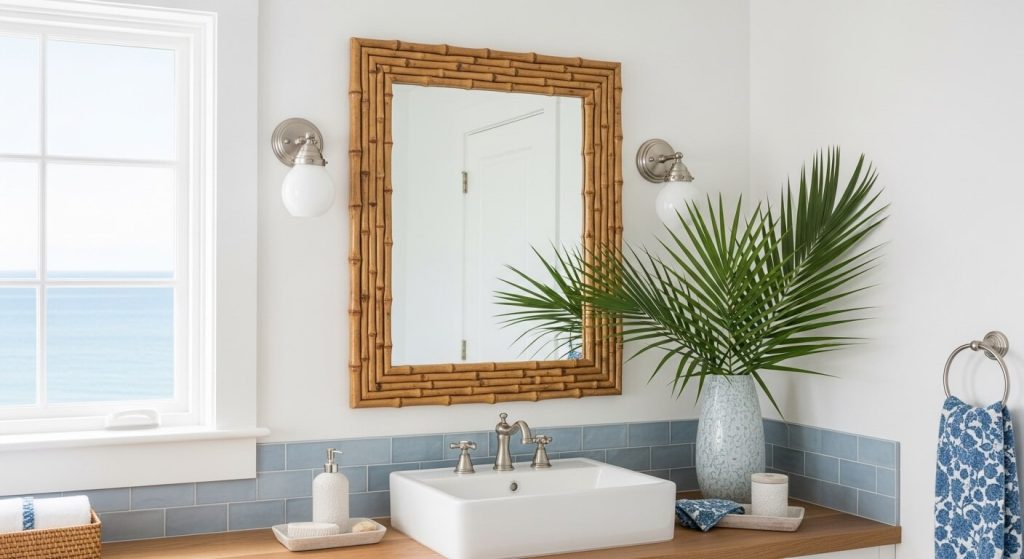
For an eco-conscious home, bamboo mirror frames are a sustainable and beautiful alternative. Their light tone brings warmth and Zen energy.
- Best for: Tropical, eco-friendly, or bohemian styles
- Pros: Lightweight, moisture-resistant, green choice
- Cons: Fewer design variations compared to wood
Leather – Sophisticated and Unique
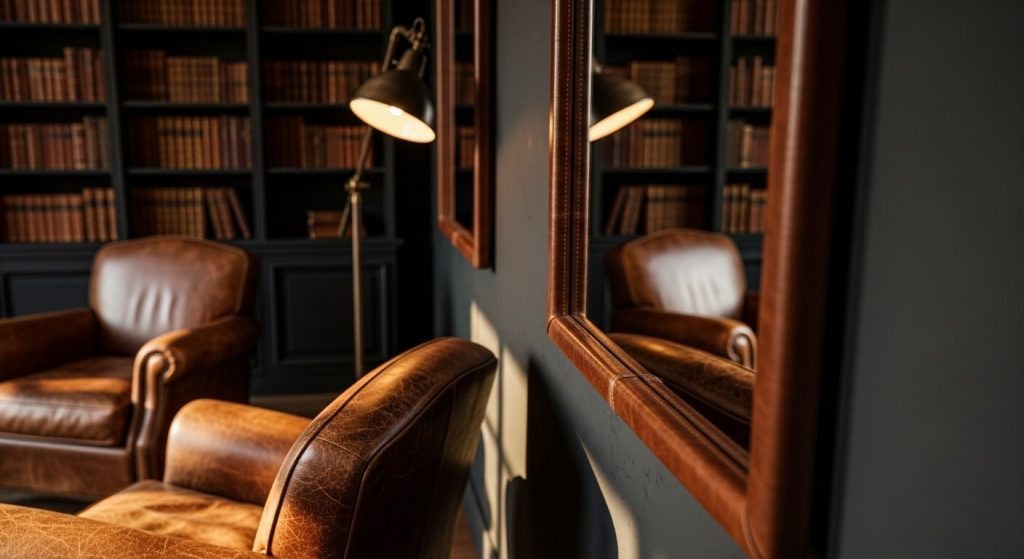
A leather mirror frame brings texture and richness to a room. Ideal for upscale or cozy interiors, this material blends luxury with warmth.
- Best for: Offices, boho bedrooms, masculine or modern spaces
- Pros: Elegant, tactile, soft appeal
- Cons: Sensitive to humidity, costly
Pro Tip: Full-grain leather adds premium durability and patina over time.
How to Choose the Best Mirror Frame Material for Your Room
To create visual harmony, match your mirror frame styles with your existing bedroom furniture:
| Room | Recommended Mirror Frame Material |
|---|---|
| Bathroom | Metal, Stone, Bamboo |
| Living Room | Wood, Resin, Leather |
| Bedroom | Wood, Leather, Resin |
| Kids’ Room | Plastic |
| Office | Leather, Metal |
Think about climate (humidity, temperature), style (modern vs. traditional), and maintenance requirements before choosing a mirror frame.
Care and Maintenance Tips by Material
Proper care keeps your mirror border design looking fresh for years:
- Wood: Use a dry cloth; avoid direct water exposure
- Metal: Wipe dry to prevent oxidation
- Plastic: Clean with gentle, non-abrasive products
- Resin: Dust gently with a soft brush
- Stone: Use pH-neutral cleaners only
- Bamboo: Keep away from harsh sunlight and water
- Leather: Apply leather conditioner periodically
Where to Shop for Quality Mirror Frame Material Products
Here are some reliable places to shop for wooden mirror frames, leather mirror frame options, and more:
Always read product descriptions for mirror material types and check reviews before purchasing.
Final Thoughts – Mirror Frame Material Is More Than Just Decoration
Choosing the right mirror frame material transforms a basic mirror into a centerpiece. It’s a reflection of your personality, your style, and your home’s overall vibe. Whether you go with a wooden mirror, a metal frame, or a stunning leather mirror frame, the right choice can elevate your room with style and substance.
Frequently Asked Questions (FAQ)
Which mirror frame material is best for bathrooms?
Metal framed mirrors, especially those with brass or chrome finishes, work best in bathrooms due to their moisture resistance. Plastic frame mirrors are also a budget-friendly, waterproof option.
Is a wooden frame mirror suitable for humid areas?
Yes, but only if it’s properly sealed. Avoid placing untreated wooden frame mirrors in high-moisture environments.
Are leather framed mirrors durable?
Yes. Leather framed mirrors are both stylish and durable, especially when crafted from full-grain leather. Avoid excessive moisture to maintain its quality.
What’s the difference between rattan and wicker mirror frames?
Rattan is the actual material (a type of palm), while wicker refers to the weaving process. So a mirror with wicker frame might be made from rattan, bamboo, or synthetic materials.
Can plastic frame mirrors look elegant?
Definitely! Modern plastic frame mirrors can mimic marble, wood, or metal with impressive accuracy while remaining affordable and lightweight.
